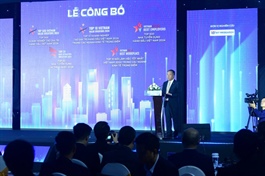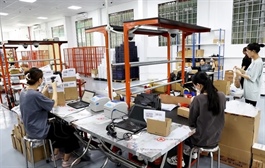Testing future predicted for technology startups in Vietnam
Testing future predicted for technology startups in Vietnam
In recent years, the promising land of technological startups has been getting more barren. These startups see numerous challenges ahead.
The most noticeable thing is that now the gap between technology companies and big corporations has gone, especially looking at banking apps or some ride-hailing apps. Many technology employees have been working for big corporations, which can pay them better salaries than in startups, along with a favourable and less-risky working environment.

Tran Duc Huy, chief growth officer, Rootopia |
In this industry, by having talented people, providing good conditions, and listening, corporations can immediately gain all the knowledge and experience from technology startups that have spent decades learning and testing.
If listed, it is very difficult for big corporations to explain to shareholders about burning so much money for customers. While startups have support from venture capital, educating customers is always a huge advantage, contributing to changing their online behaviour.
In the beginning, the slogan ‘the winner takes it all’ was an inevitable rule in the startup industry - take Google in the search field and Facebook in social networking, for example. However, now the winner takes less and less because the barrier to entry in the tech industry is no longer high.
Grab thought it won against Uber, but then Gojek, Be, and Xanh appeared. Each player occupies a group of customers with various positions. The balance that was tilted towards opportunities in the past is now tilted towards risks.
The success today only helps big corporations and tech giants realise the promising land. The more successful startups get, the sooner tech giants will become your competitors.
The philosophy that having users means having money, no longer works. This has changed a lot, and the user acquisition phase and the monetisation phase are two different things.
Startups even have to spend more resources to monetise customers. But if customers are used to freemium products or are addicted to receiving vouchers, charging fees will be extremely difficult.
The world is getting smaller. In the past, whenever a foreign model was successful, Vietnamese startups immediately cloned it. Now, they have enough time to be a few steps ahead. The localisation advantage is also clearly shown through the example of Grab beating Uber out of Southeast Asia. However, this advantage is gradually disappearing. Startups now have to fight directly with big giants such as Google and Microsoft, and especially in management software.
Although the AI trend has just emerged, AI apps developed by overseas companies can work with the Vietnamese language very well and proficiently. The competition is becoming more and more fierce. Foreign startups are also witnessing the acquisition and merging of tech giants, or cloning each other to defeat competitors from the beginning.
Venture funds prefer less risky projects, interested in the monetisation of startups. Numerous startups have burned money without creating any real value. So startups have to prove their ability to make money and also prove their ability to grow and scale up well. This may be the most challenging problem they struggle with.
In addition to these challenges, some big movements, which are necessary for startups to survive in the upcoming difficult and challenging times, are occurring, for example, the shift from good experience to good business model. Good experience for users used to be the lifeblood of startups’ technology products. But these days, knowledge and the standard on user experience and user interface has been improved. A good experience product is no longer a very different competitive advantage as compared to a different creative business model.
In the past, startups were already aware of developing niche markets. However, they have to go deeper and more specific segments, like the markets are small enough, the bait is not delicious enough for big corporations and big tech. But startups still have to think about scaling up, thinking about how to expand the market and customers.
The shift from business-to-consumer to business-to-business started at the end of 2019, and getting stronger. Instead of burning marketing money to acquire end users, startups are shifting to sales performance to exploit the networks they already have.
The market is getting much more challenging, so successful startups at this time have to be outstanding, and with extremely intelligent teams. The difficulties of startups also help each person realise their own strengths and weaknesses, and they become more humble and open to learning new knowledge as a result.
I still believe that as long as startups always strive to learn and improve constantly, they can at least stay in the industry for a time, and get positive results if they are lucky.



























